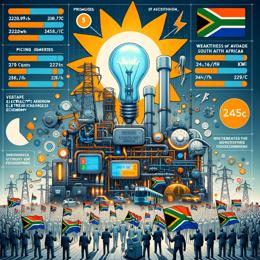Image created by AI
South Africa Embraces Solar and Battery Storage in Landmark Energy Shift
In a significant push towards renewable energy adoption, South Africa's Minister of Electricity and Energy, Dr. Kgosientsho Ramokgopa, wrapped up the year with a pivotal announcement during the last Energy Action Plan briefing on December 23, 2024. Unveiling the details in Tshwane, Dr. Ramokgopa introduced the eight preferred bidders for the seventh bid window of the Renewable Energy Independent Power Producer Procurement Programme (REIPPPP) and the second bid window of the Battery Energy Storage Independent Power Producer Procurement Programme (BESIPPPP).
This strategic announcement comes after a record nearly 300 days without load shedding in 2024, a milestone that reflects the longest period of uninterrupted power supply the nation has witnessed in five years. "Although we celebrate these achievements, our goal is to establish them as the norm, not merely an exception," Dr. Ramokgopa emphasized during the briefing.
The solar projects, chosen exclusively under Bid Window 7, account for a combined 1,760 Megawatts (MW) of power, representing a substantial investment of R31.4 billion. These projects are distributed across Mpumalanga, Limpopo, Free State, and North West. Apart from bolstering the nation's power supply, these initiatives are projected to create 6,971 jobs and allocate a significant portion of their budget—38.8% or R7.8 billion—towards local content during the construction phase.
Simultaneously, the advancement of battery storage technology under Bid Window 2 of BESIPPPP is set to allocate 615 MW across eight sites positioned strategically in North West, Gauteng, and Free State. This arm of the project expects to see a total investment of R12.8 billion which promises another influx of employment opportunities—approximately 1,570 jobs during both construction and operational phases.
Dr. Ramokgopa also highlighted the broader environmental and health responsibilities that guide these projects. By transitioning away from coal, South Africa not only aims to improve local air quality but also to substantially reduce its carbon dioxide emissions, aligning with global efforts to combat climate change.
Moreover, the shift is bolstered by legislative changes with the Electricity Regulation Act Amendment set to be effective from January 1, 2025. This amendment could potentially secure the procurement of up to 5,000 MW of renewable energy capacity, significantly shaping the future of the country's energy landscape.
As these projects move towards achieving commercial close within the next six months, they represent a palpable shift in South Africa's energy paradigm. With this strategic pivot to solar and battery storage, South Africa not only asserts its commitment to sustainable development but also positions itself as a leader in the ecological transition on the African continent.










